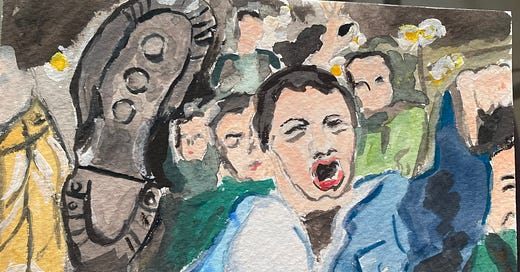A Supreme Court Victory for Students With Disabilities But Why Are Family Courts Still Ignoring the ADA?
Art by Renee kitani watercolor & gouache
By Renee Kitani | July 12, 2025
Last month, the United States Supreme Court issued a unanimous decision in A.J.T. v. Osseo Community School Districtthat could change the lives of millions of students with disabilities. The Court struck down a rule that had required disabled students to meet a higher burden of proof to bring claims under the Americans with Disabilities Act and Section 504 of the Rehabilitation Act. For once, the Court said what should have been obvious all along: disabled students are entitled to the same access to justice as anyone else.
The decision may not have made front page headlines, but its significance cannot be overstated. For decades, children with disabilities have faced an uphill legal battle just to have their rights recognized. Now, with this ruling, they are finally on more equal footing. The Court restored the full power of federal disability law not only in theory, but in practice.
Yet while the highest court in the land is affirming these rights, family courts across the country continue to violate them with impunity.
A Two Tiered System of Disability Justice
There are nearly 8 million students with disabilities in this country. Many of them live with parents or guardians who are also disabled, neurodivergent, or managing chronic medical or mental health conditions. But when those same individuals step into a family courtroom as litigants, parents, or witnesses they are frequently denied even the most basic ADA accommodations.
Requests for remote appearance, medical breaks, transcripts, captioning, or note taking assistance are routinely denied without explanation. When litigants seek to assert their rights under federal law, they are told that such accommodations are “inconvenient,” “unnecessary,” or “not within the discretion of the judge.” This isn’t just wrong. It’s unlawful.
The ADA doesn’t stop at the schoolhouse gate and it doesn’t end at the courthouse door.
But in many family courts, it’s as if the ADA never existed at all.
The Real World Consequences of ADA Violations in Family Court
When a parent with PTSD is forced to appear in a crowded courtroom with no accommodations, that is not a procedural glitch it is a denial of due process.
When a mother with ADHD or a learning disability is expected to conduct a multi day trial without a transcript, assistance, or remote option, while opposing counsel exploits that imbalance, it is not merely an inconvenience it is a civil rights violation.
When a litigant requests accommodations and is then retaliated against with sanctions, rulings in absentia, or custody transfers, the damage is not just personal it is systemic.
Family court is often held up as a forum for protecting the “best interest of the child,” yet it routinely fails to protect the constitutional and statutory rights of parents with disabilities, even when those disabilities are well documented and legally protected.
Why Must We Go All the Way to the Supreme Court?
The A.J.T. decision is a victory, but it raises an unsettling question: Why must disabled people fight their way up to the Supreme Court to get rights they already had?
Why are lower courts including those charged with the most intimate and life-altering decisions still permitted to sidestep federal law?
Why isn’t the Department of Justice more proactive in holding state courts accountable under Title II of the ADA?
Why are judges, evaluators, and custody experts allowed to operate in a legal vacuum where disability is too often framed as a deficiency instead of a protected status?
We should not need a landmark ruling to affirm what Congress made law in 1990. But the persistence of these inequities tells us something important: the problem isn’t just ignorance of the law. It’s disregard for it.
It’s Time for Accountability
The legal principle is clear: public entities, including state courts, are bound by the Americans with Disabilities Act. That includes the obligation to provide reasonable accommodations and ensure meaningful access to court proceedings.
It’s time for litigants, advocates, and attorneys to start treating these failures not as isolated injustices, but as violations of civil rights law.
It’s time for disability access coordinators to be empowered and for judges to be educated or removed when they continue to deny rights unlawfully.
It’s time to build on the momentum of A.J.T. and extend that same clarity, courage, and constitutional reasoning to the courts where justice is still being denied behind closed doors.
Because every time a parent is denied ADA accommodations in family court, a precedent is being set not just for their case, but for every other disabled person who walks through that door.
And justice delayed is not just justice denied. It’s discrimination.




